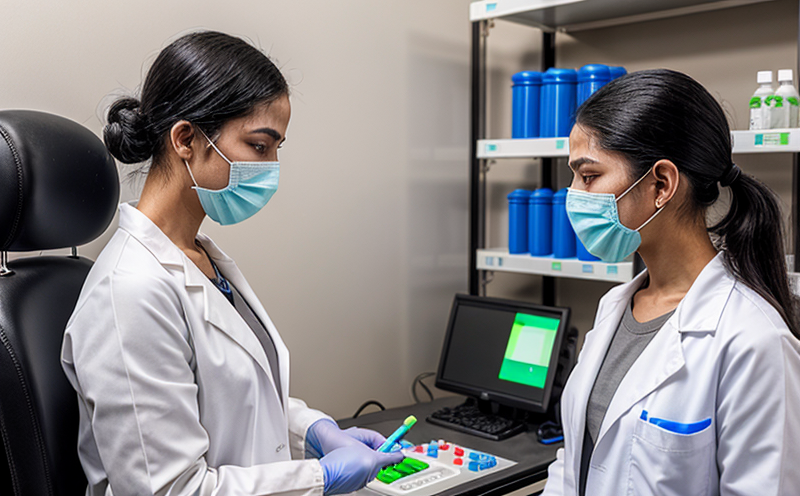In Vivo Mutation Frequency Determination Testing
The in vivo mutation frequency determination testing is a critical component of pharmaceutical development and regulatory compliance. This method evaluates the genotoxic potential of chemical substances or compounds, which can lead to mutations that might result in carcinogenic effects if not controlled early in the drug discovery process.
This type of testing is essential for ensuring the safety of new drugs and formulations before they enter clinical trials and eventually reach the market. By identifying potential mutagens at an early stage, pharmaceutical companies can avoid costly delays and prevent the release of products that might pose health risks to consumers.
The process involves administering test substances to animals under controlled conditions and observing the occurrence of mutations in specific genetic loci. This allows for the determination of mutation frequencies associated with each compound tested. The results provide valuable insights into the genotoxicity profile, helping researchers make informed decisions about further development or potential modifications to improve safety.
For instance, this testing is often required by regulatory bodies like the FDA and EMA as part of their stringent guidelines on drug safety. Compliance ensures that pharmaceutical products meet international standards for quality assurance and patient protection.
The methodology typically follows ISO 13428-2:2007, which specifies procedures for in vivo mammalian mutagenicity tests using the Ames test. This standard guides laboratories in conducting tests to ensure consistency and reliability across different facilities worldwide.
Understanding the intricacies of this testing requires a deep dive into both technical aspects and practical applications within the pharmaceutical industry. From preparing samples correctly according to strict protocols to interpreting results accurately, every step must be meticulously followed to achieve reliable outcomes.
- Why Choose This Test: It helps identify potential risks early in development, ensuring safer products.
- Why Choose This Test: Regulatory compliance is crucial for drug approval processes.
In summary, the in vivo mutation frequency determination testing plays a vital role in safeguarding public health while advancing innovative treatments. Its importance cannot be overstated given its direct impact on ensuring medication safety and efficacy.
Eurolab Advantages
At Eurolab, we pride ourselves on providing comprehensive pharmaceutical testing services that meet the highest industry standards. Our state-of-the-art facilities and experienced team ensure accurate and reliable results every time.
- Accurate Results: Leveraging cutting-edge technology and methodologies, our tests deliver precise outcomes tailored to your specific needs.
- Comprehensive Services: We offer a wide range of testing options beyond just mutation frequency determination, ensuring holistic support for all aspects of your research and development process.
Our commitment to excellence extends beyond technical expertise; we also emphasize exceptional customer service and timely communication throughout the entire testing cycle. Whether you're conducting routine checks or preparing for a new product launch, trust Eurolab to provide the solutions you need.
Why Choose This Test
- Comprehensive Evaluation: Identifies potential genotoxic risks early in development.
- Regulatory Compliance: Ensures adherence to international standards and guidelines.
- Precision & Reliability: Utilizes advanced techniques for accurate measurement of mutation frequencies.
The in vivo mutation frequency determination testing is a cornerstone of pharmaceutical safety assessments. By employing this method, companies can minimize the risk of releasing products that might cause adverse effects due to uncontrolled genetic alterations. This proactive approach not only protects consumers but also enhances brand reputation by demonstrating a commitment to quality and ethical practices.
Environmental and Sustainability Contributions
The in vivo mutation frequency determination testing contributes significantly to environmental sustainability by promoting responsible drug development practices. By identifying potential genotoxic agents early on, this testing helps prevent the introduction of harmful compounds into ecosystems through pharmaceutical waste streams.
- Eco-Friendly Production: Ensures that only safe and sustainable ingredients are used in manufacturing processes.
- Sustainable Formulations: Encourages the creation of products with minimal environmental impact throughout their lifecycle.
Beyond just reducing harm, this testing supports a circular economy by fostering innovation aimed at developing greener alternatives whenever possible. Through rigorous evaluation and continuous improvement efforts, pharmaceutical companies can contribute positively to global sustainability goals while maintaining high levels of product safety and effectiveness.





